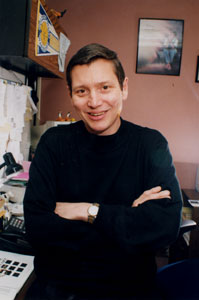|
HOME | SEARCH | ARCHIVE |
|
Staff scholar chases bad debts by day, Bismarck and Napoleon III by night
![]()
By Nancy Chapman, Public Affairs
| |  David Wetzel Peg Skorpinski photo |
29 November 2001
|
The media are full of stories of Ph.D.s driven outside their fields by the scarcity of academic positions. You’ve heard them: the classicist calculating executive compensation at UC Office of the President; the political scientist programming at PeopleSoft; the sociologist fixing cars in San Pablo. Here’s another: David Wetzel, a scholar of 19th-century European diplomatic history collecting money from Berkeley students who have defaulted on their loans. But Wetzel, an administrative analyst in Loans and Receivables since 1986, hasn’t abandoned his academic roots. The University of Wisconsin Press just published his fourth book, “A Duel of Giants: Bismarck, Napoleon III, and the Origins of the Franco-Prussian War” — written, like his three previous books, while he was employed full time at Berkeley. With those four scholarly publications and proficiency in five languages to his credit, Wetzel’s choice of employment invites questions. He received his doctorate in history from the University of Chicago in 1976, just as public support for the humanities was collapsing in favor of funding for more practical, technical fields. Despite the strong backing of his professors, Wetzel couldn’t get an academic position. He eventually came to San Francisco, worked odd jobs, and landed at Berkeley. Wetzel has managed, through hard work and the cooperation of his supervisors, to tailor his campus job to serve his intellectual and academic interests. His immediate supervisor, Eric Anglim, allows him the flexibility to work four long days a week so he can spend three- But no amount of departmental accommodation can explain how he packs so much into a single life. Here’s how he does it: Wetzel rises at 4:30 a.m. Monday through Thursday to work on writing, correcting proofs and compiling an index. If he’s between books, he uses the hour to access German newspapers on the Internet, so as to sharpen his language skills. Next he commutes from San Francisco to Berkeley, where he and collects unpaid bills until 5 p.m. Back home, he resumes his morning project at 6:30 p.m., works for an hour, exercises for 15 minutes, eats at 8 p.m., is in bed by 9. “Thursday evening is my break,” he says. “I might go out to dinner. Then I write all day Friday, Saturday and Sunday. “I’m disciplined to a fault,” he says. “Social life? That’s a problem.” For vacations Wetzel travels to Europe to visit foreign ministry archives in Vienna, Paris, Berlin, Munich, Budapest, Florence. Many diplomatic primary-source documents are in French and German, in which he is fluent. He also reads and speaks Italian, Russian and some Spanish. “I love languages,” he said. “They are my middle-age passion.” Nineteenth-century Europe holds particular fascination for Wetzel Although a time of relative peace compared with the 18th and 20th centuries, the period was punctuated with four short and bloody crises. “I’m attracted to crisis. Societies go through spasms, and I’m interested in what happens in those spasms,” he says. Defying current theories that individuals are puppets of outside forces, Wetzel believes that great figures shape events. “The history of 19th-century Germany would have been different without Bismarck, Russia would have been different without Lenin and Stalin,” he said. “These people made decisions under the vortex of tremendous pressure...As I get older, I become more convinced of the importance of the individual.” For “A Duel of Giants,” Wetzel plumbed the archives for ways in which turmoil, intrigue and backstabbing shaped the personalities of Bismarck and Napoleon III and vividly colored their times. Wetzel sometimes thinks of resuming his search for an academic position — especially to use those paid sabbaticals for research — but he is content with his current life. “I’m attracted to upheaval,” he says, “but not in my own life.”
day weekends writing. And he Wetzel had the good sense to pick a job that would afford him access to one of the world’s best library systems.
Home | Search | Archive | About | Contact | More News
Copyright 2000, The Regents of the University of California.
Produced and maintained by the Office of Public Affairs at UC Berkeley.
Comments? E-mail berkeleyan@pa.urel.berkeley.edu.